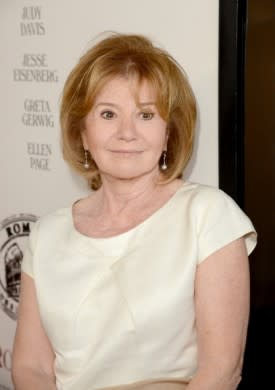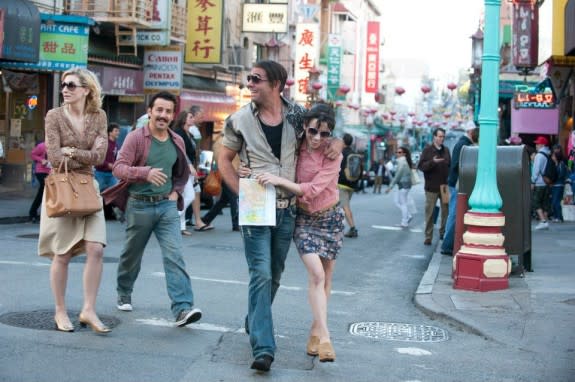OSCARS Q&A: Letty Aronson On Her Partnership With Big Brother Woody Allen & Their Collaboration On ‘Blue Jasmine’
For almost 20 years, Letty Aronson has been producing the films of her big brother, Woody Allen: She worries about the commercial concerns while Allen focuses on the creative. Their partnership is such a well-oiled machine that Aronson admits, “I’m so used to the way he works, it always bothers me when someone else doesn’t work that way.” Aronson got her start as a producer working with Jean Doumanian, then took over producing Allen’s films after his working relationship with Doumanian ended in a bitter legal battle. Since then, she’s kept up Allen’s pace of making a film a year, and earned her first Oscar nomination for 2011’s Midnight In Paris. Aronson’s most recent production is Blue Jasmine, which has been a hit at the box office and has given Cate Blanchett frontrunner status for a best actress Oscar.
Related: OSCARS: Ballots Are Out And The Race Is On, But Will Voters See The Movies In Time?
AwardsLine: Has it gotten any easier to finance the films you produce, especially considering the strength of Woody Allen as a brand?
Letty Aronson: Not really. (Laughs.) Except for independent financiers in this country, we get no money from any studio, not even a discussion. After all the hullabaloo of Midnight In Paris, I didn’t get one call from any studio. But I can understand that because they don’t work the way we work. In going out and looking for money, I tell people right up front: They can’t read the script; they don’t have input into the cast; they don’t see dailies; they don’t see a rough cut. They’re really investing in Woody and his reputation. They’re not going to make hundreds of millions of dollars, either. We’re low risk, low reward. The studios don’t work that way, but in Europe, there’s never been a studio system. It’s really always been independent financiers. So it’s easier to go there (with) all these different rules and get money. We don’t want to spend a lot on the films because we would like to pay our investors back. For some, we put together a three-picture deal. If we don’t know the people, I don’t love putting together a three-picture deal because who knows if we’ll like working with them after the first picture? But it’s not any easier. A film like Blue Jasmine, which got the most spectacular reviews, is up to almost $34 million in this country. Now another film without Woody’s name on it that got those kind of reviews would earn three times that much.
AwardsLine: At what point does Woody include you in the script process?
Aronson: After he writes it, he spends a couple of weeks not looking at it, and then he polishes it. Or polishes it for right then because there are rewrites that go on through filming. Then I read it.
AwardsLine: Do you give him notes?
Aronson: I don’t. I mean, if I think of something, I’ll say, “I didn’t understand this,” that kind of thing. But it’s not note notes.
AwardsLine: Do you have an idea about the general direction he’s thinking about going when you approach financiers? I know he doesn’t start writing until all of the money is in place.
Aronson: We discuss what would be a good genre to do for the next film. Should it be a romantic comedy? Should it be something more serious? But that doesn’t mean when all is said and done and he sits down to write, that is it. They have to buy into it because it’s Woody. He doesn’t care what’s marketable. He likes to make a movie that he thinks is worthwhile making. He never looks at it from the commercial side.
AwardsLine: How involved are you in the marketing of his films?
Aronson: We have in our agreement that we have to approve the marketing and the amount of money (the distributors) spend on it. Also, Woody gets final approval on everything they do, whether it’s an ad or a trailer or a poster. He has all the creative control. He has the right to veto, but he’s not difficult about it.
Related: OSCARS: Will Critics & Precursor Awards Carry More Weight In A Jam-Packed Year?
AwardsLine: You’ve said you’ve never had a budget crisis on set. What’s the key to keeping these films on time and on budget?
Aronson: First of all, we only have enough money to shoot a certain number of weeks, so it has to fit into that. There’s no alternative for us. But we have been working in some areas where there’s been some tax incentives—better in some places, terrible in others. For Blue Jasmine, we did not win the California tax-incentive lottery, but we did get some local help in San Francisco. Our fees that we pay are very low. We don’t ask a lot of the actors. They don’t come weeks before. Woody never rehearses. And I think it’s pleasant working conditions. Woody’s very relaxed with the cast and likes them to do their thing and is not an over-director type. Somehow it works. We’re very strict about the budget to begin with and before we start we take out every bit that would be extra. I really feel that a big part of my job—besides getting the money—is to see to it that Woody has what he needs to make the film that he has envisioned.
AwardsLine: You’re a lot more involved with awards season than Woody, who famously hates to come to Los Angeles. Do you enjoy it?
Aronson: For me, it’s a lot of fun. For Woody, it’s not. Also, I see the value in it when I’m raising money or selling the film, or even in getting actors and actresses to do films with us.
Related: OSCARS: The Challenge Of Sustaining Buzz Through A Long Awards Season
Related stories
OSCARS: After Big Weekend 'Blue Jasmine's Cate Blanchett Storms Into 2013 Race
Specialty Box Office: Woody Allen's 'Blue Jasmine' Beats 'Midnight In Paris' Debut
Deadline Awards Watch Podcast 57 – Talking With Bradley Cooper And Cate Blanchett
Get more from Deadline.com: Follow us on Twitter, Facebook, Newsletter


